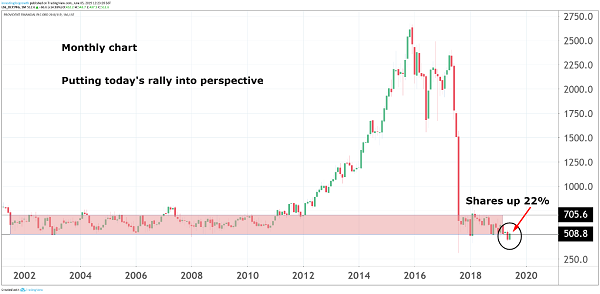Provident Financial failure gives Neil Woodford new headache
Not getting your own way when you own a quarter of the company hurts as Neil Woodford found out today.
5th June 2019 12:05
by Graeme Evans from interactive investor
Not getting your own way when you own a quarter of the company hurts as Neil Woodford found out today.

As if this week hasn't been bad enough, Neil Woodford was on the wrong side of more corporate news today with the collapse of a long-running takeover battle involving Provident Financial (LSE:PFG).
Woodford Investment Management, which holds about 25% of Provident shares, had backed the bid by Non-Standard Finance because it believed that the "more experienced management team" at the rival sub-prime lender could extract additional value for shareholders.
Many other Provident investors disagreed, however, with the 54% of acceptances received by today's deadline insufficient for Non-Standard to proceed with its £1.1 billion hostile takeover. The level of acceptances meant that the combined group would not have been able to meet regulatory capital standards at the time of the deal's completion.
It's another blow for Woodford and his contrarian approach to UK investing, following on from the suspension of his UK Equity Income fund and Monday's profits warning at Kier (LSE:KIE), in which Woodford holds a 20% stake.
The 22% surge in the Provident share price to 543p following last night's collapse at least provided some upside benefit for the Equity Income Fund, which has 5% of its exposure in Provident. Woodford is also the biggest shareholder in Non-Standard Finance, whose shares fell 6% to 44.2p as it emerged it faces £10 million in fees relating to the planned transaction.

Source: TradingView Past performance is not a guide to future performance
Non-Standard is led by John van Kuffeler, who was at the helm of Provident during a long period of profitable expansion in the 1990s and early 2000s. A takeover would have resulted in market-leading positions in credit cards, home credit and branch-based lending, as well as potential revenue and cost synergies.
Provident today criticised the "unnecessary distraction, cost and impact" of the takeover saga, which started in mid-February. Schroders, which owns 14.6% of Provident, was among those to criticise the bid last month, saying that it risked destabilising the company's recent recovery and brought “additional regulatory risks and uncertainty."
After facing a number of issues in recent years, including the botched restructuring of its consumer credit arm, Schroders said that a recent trading statement showed Provident was "on track with its recovery and rehabilitation".
Earnings per share grew by 27% to 46.6p in annual results in March, allowing the reinstatement of the dividend with a nominal payment of 10p per share due to be paid this month.
Investors will now be looking for signs of continued momentum from a stock that had been trading at more than 2,000p just two years ago. That was until former boss Peter Crook's ill-fated plan to overhaul the lender's doorstep collection model by replacing self-employed agents with full-time staff.
The restructuring backfired and the company also found itself the subject of two regulatory investigations. One of these resulted in Vanquis Bank, which offers credit cards to people who are typically declined by mainstream providers, having to refund one million customers of its Repayment Option Plan.
- Should you take a contrarian punt on Kier Group shares?
- Kier shares crash 40% to 20-year low
- New Provident Financial crash gives Neil Woodford a headache
So far, new CEO Malcolm Le May has delivered on the promises made at the time of a rights issue in March last year. The operational improvement in consumer credit continues, while profits are growing at both Vanquis and the Moneybarn vehicle finance unit, although an increase in impairments at Vanquis unnerved investors in January.
However, Woodford said at the time: "With employment strong and real wage growth coming through, the economic outlook for Provident Financial remains benign.
"As the recovery continues and the UK economy improves through the year, the business continues to look capable of delivering a very attractive rate of growth in 2019."
These articles are provided for information purposes only. Occasionally, an opinion about whether to buy or sell a specific investment may be provided by third parties. The content is not intended to be a personal recommendation to buy or sell any financial instrument or product, or to adopt any investment strategy as it is not provided based on an assessment of your investing knowledge and experience, your financial situation or your investment objectives. The value of your investments, and the income derived from them, may go down as well as up. You may not get back all the money that you invest. The investments referred to in this article may not be suitable for all investors, and if in doubt, an investor should seek advice from a qualified investment adviser.
Full performance can be found on the company or index summary page on the interactive investor website. Simply click on the company's or index name highlighted in the article.